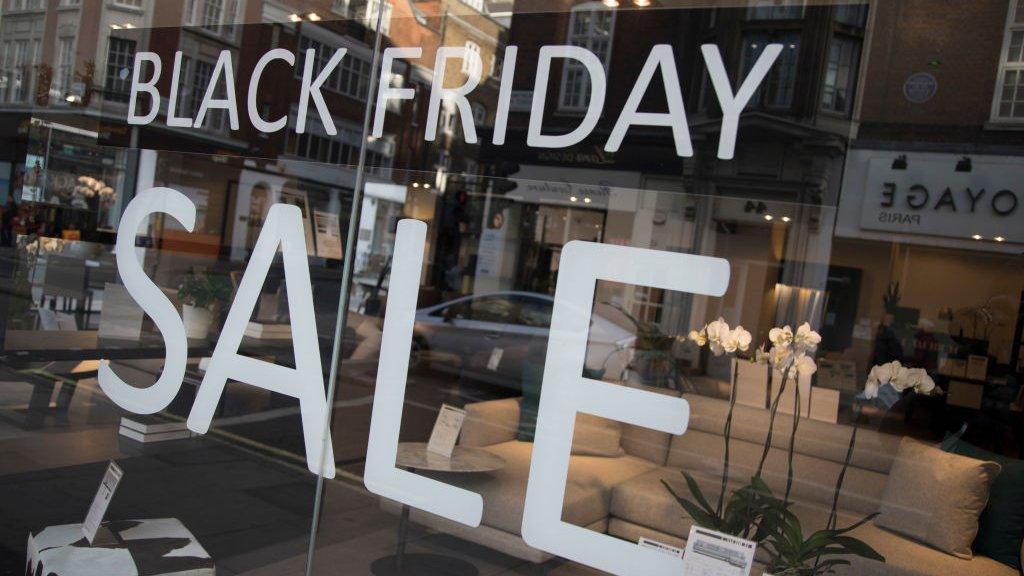Warning on 'misleading' Black Friday deals
- Published
Consumer affairs correspondent Colletta Smith's top tips for online shopping
The advertising regulator has warned consumers that some Black Friday deals may be misleading.
Guy Parker, chief executive of the Advertising Standards Authority, said that the rapid pace of change online is "fuelling people's concerns about whether everything they see and read is true".
"It becomes more difficult to establish whether the price you're being offered a product at is indeed a good price," he added.
Dr Gareth Harvey, a consumer psychologist who studies how retailers try to influence customers, says Black Friday deals are all about grabbing attention with big signs and numbers.
"Shopping in the sales is a very different frame of mind. A website or shop will look different. Normally a retailer hides the price, so it is the last thing we see," he said.
"They want you to buy into the product and think it's worth the money. But on Black Friday or the sales, the price or big discount is what you see first. But you're not concentrating on the product and whether it is what you want."
Shoppers in Wrexham who spoke to the BBC conveyed their experiences of online retail therapy.
Emma Wilson, who runs Emz Cakes on the town's high street, said she has felt pressured into a purchase because of a clock countdown on discounted dresses: "I even added extra things to my basket that I wouldn't have done otherwise - you feel cheated."
Friend Claire Nicholas has two young children and now does most shopping online. "I'm a sucker for a deal - especially on kids clothes - and I'll add stuff to my basket to get the free shipping," she said.

Claire Nicholas, Emma Wilson and Michelle Powis
Her co-worker Michelle Powis has two teenage sons and said buying the brands they want can be expensive: "I do try to look for the deals, but sometimes I will buy something just in case I lose the offer."
Emz Cakes will also be getting on the Black Friday bandwagon, offering cut-price afternoon teas. Its discounts will "absolutely be genuine", Ms Wilson stresses.
Dr Harvey says tactics such as clock countdowns or highlighting limited stock or how many people are looking at an item, pile on the pressure to buy quickly in a bid to keep a shopper on that website or app.
"We've put people in a brain scanner and get them to shop online," he says. "After about 12 minutes they become mentally exhausted. They stop making good decisions or analysing their choices and taking shortcuts, thinking 'I'll just get one of those'."
It is therefore unsurprising that most of the Advertising Standards Authority's work is now focused on online promotions. Mr Parker said consumers should remember that the same rules apply to discounts and deals whether they are on TV, a billboard or in an email.
The ability of a business to change the price of a product numerous times a year means it can be hard for the regulator and consumers to keep up.
The watchdog said businesses have a duty to ensure that deals are clear and that they anticipate demand for a product to ensure items are available.
Mr Parker urged consumers to contact the ASA, external if they encountered a deal they think if misleading or untrue.
- Published21 November 2018

- Published20 November 2018
